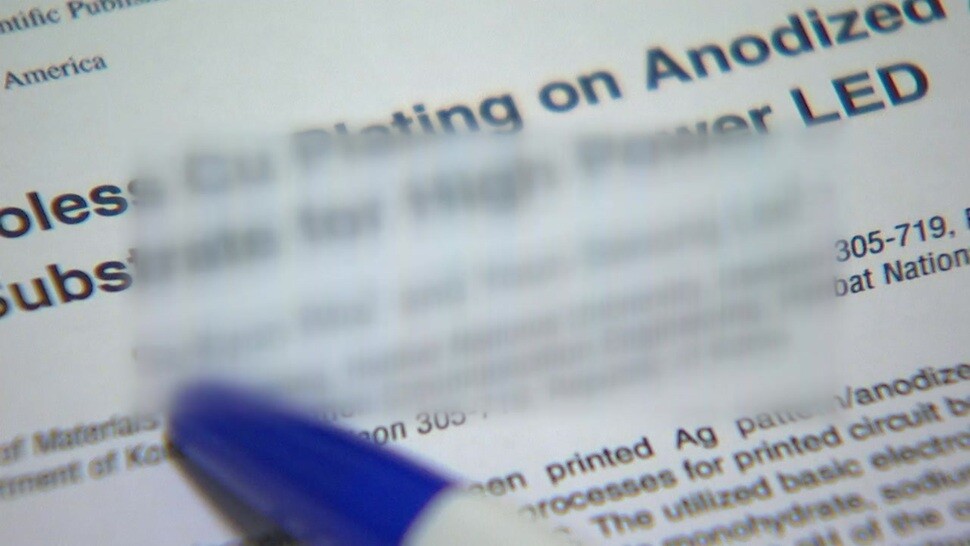hankyoreh
Links to other country sites 다른 나라 사이트 링크
University professors listing their children as co-authors of research papers

Over the past 10 years, there have been 82 cases in which university professors listed their middle school or high school-age children as co-authors on academic papers, a recent study found. Some think the study has turned up a bigger problem: the efforts by some academics to pass down not only their material wealth but also the intangible asset of being an author of research papers to their children.
These 82 cases, which occurred at 29 universities around the country, were found by a study of inappropriate author attribution in academic papers published over the past 10 years by around 70,000 full-time teaching staff at four-year universities around the country. The results of the study, which was carried out by the Ministry of Education, were published on Jan. 25.
More specifically, there were 43 cases in which professors listed their children as coauthors without any valid reason, such as the paper being linked to their children’s curriculum, while there were 39 cases in which the paper was linked to curriculum, with the children registered in a program through which universities work with middle and high schools to help students write research papers.
“Even when the paper was linked to curriculum, there seems to be considerable potential for problems, since we haven’t been able to confirm whether these minors had the ability to be listed as second or third authors,” said an official at a Ministry office in charge of promoting academic affairs.
The universities that were identified in the study included Sungkyunkwan University (8 cases), Yonsei University (7), Kookmin University (6) and Seoul National University (6). The university with the most cases of professors adding their children’s names arbitrarily without any link to curriculum was Seoul National University (6). Eighty of the 82 cases, or 97%, were in the sciences and engineering, while 87% of the total occurred while the children were in their second or third year of high school.
“Under current legislation, listing someone as an author when they did not contribute to research clearly counts as inappropriate research behavior. We’re planning to request a review of this research by referring all 82 cases to the research ethics committees of the universities in question,” the Ministry of Education said.
If papers that were inappropriately attributed are found to have been used in the university admission process, the Ministry is also planning to ask the universities in question to cancel the students’ admission. University applicants have been banned from including research paper authorship on their school transcripts since 2014, and they are also prohibited from submitting research papers as extracurricular work on their general application forms.
Certain universities, including KAIST (Korea Advanced Institute of Science and Technology), have listed research papers as a possible qualification for those applying for special admission, which leads the Ministry to believe that these research papers may still have been used for university admission. The Ministry is planning to revise its guidelines for research ethics to make it mandatory for journals to list the grade and school of authors found to be a minor.
Some see the practice of listing teenage children as the authors of academic articles as an example of parents’ attempts to bequeath their class status to their children by passing down their wealth, both tangible and intangible.
“As the university admission system has changed to include the assessment of various student activities, inequality of opportunity has arisen between children who are from social classes capable of padding their resume and those who are not. Professors and other parents who are capable of taking advantage of the altered university admission system are exploiting a situation in which they can hand down their socioeconomic status to their children,” said Shin Gwang-yeong, a professor of sociology at Chung-Ang University.
By Kim Mi-hyang, staff reporter
Please direct questions or comments to [english@hani.co.kr]

Editorial・opinion
![[Column] Season 2 of special prosecutor probe may be coming to Korea soon [Column] Season 2 of special prosecutor probe may be coming to Korea soon](https://flexible.img.hani.co.kr/flexible/normal/500/300/imgdb/original/2024/0426/3317141030699447.jpg) [Column] Season 2 of special prosecutor probe may be coming to Korea soon
[Column] Season 2 of special prosecutor probe may be coming to Korea soon![[Column] Park Geun-hye déjà vu in Yoon Suk-yeol [Column] Park Geun-hye déjà vu in Yoon Suk-yeol](https://flexible.img.hani.co.kr/flexible/normal/500/300/imgdb/original/2024/0424/651713945113788.jpg) [Column] Park Geun-hye déjà vu in Yoon Suk-yeol
[Column] Park Geun-hye déjà vu in Yoon Suk-yeol- [Editorial] New weight of N. Korea’s nuclear threats makes dialogue all the more urgent
- [Guest essay] The real reason Korea’s new right wants to dub Rhee a founding father
- [Column] ‘Choson’: Is it time we start referring to N. Korea in its own terms?
- [Editorial] Japan’s rewriting of history with Korea has gone too far
- [Column] The president’s questionable capacity for dialogue
- [Column] Are chaebol firms just pizza pies for families to divvy up as they please?
- [Column] Has Korea, too, crossed the Rubicon on China?
- [Correspondent’s column] In Japan’s alliance with US, echoes of its past alliances with UK
Most viewed articles
- 1‘We must say no’: Seoul defense chief on Korean, USFK involvement in hypothetical Taiwan crisis
- 2After election rout, Yoon’s left with 3 choices for dealing with the opposition
- 3AI is catching up with humans at a ‘shocking’ rate
- 4Why Kim Jong-un is scrapping the term ‘Day of the Sun’ and toning down fanfare for predecessors
- 5[Editorial] Korea’s surprise Q1 growth requires objective assessment, not blind fanfare
- 6Noting shared ‘values,’ Korea hints at passport-free travel with Japan
- 7Two factors that’ll decide if Korea’s economy keeps on its upward trend
- 8Gangnam murderer says he killed “because women have always ignored me”
- 9The dream K-drama boyfriend stealing hearts and screens in Japan
- 10Yoon says collective action by doctors ‘shakes foundations of liberty and rule of law’